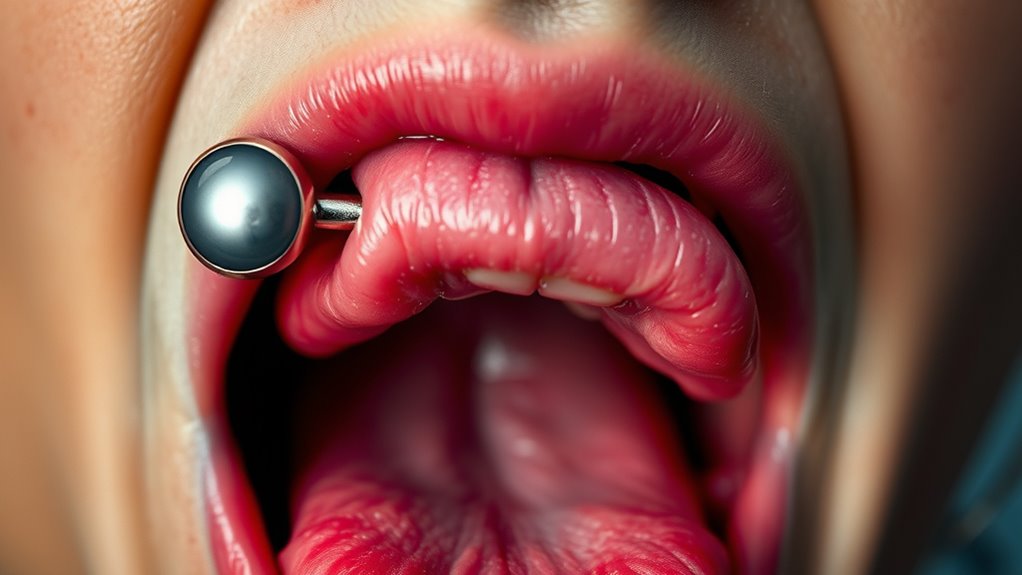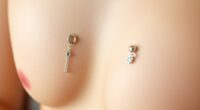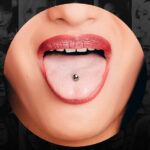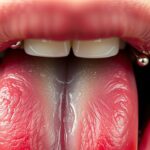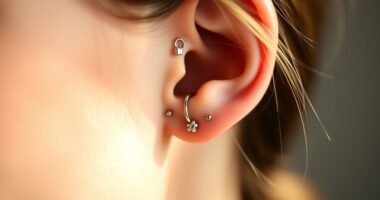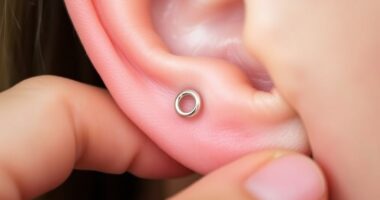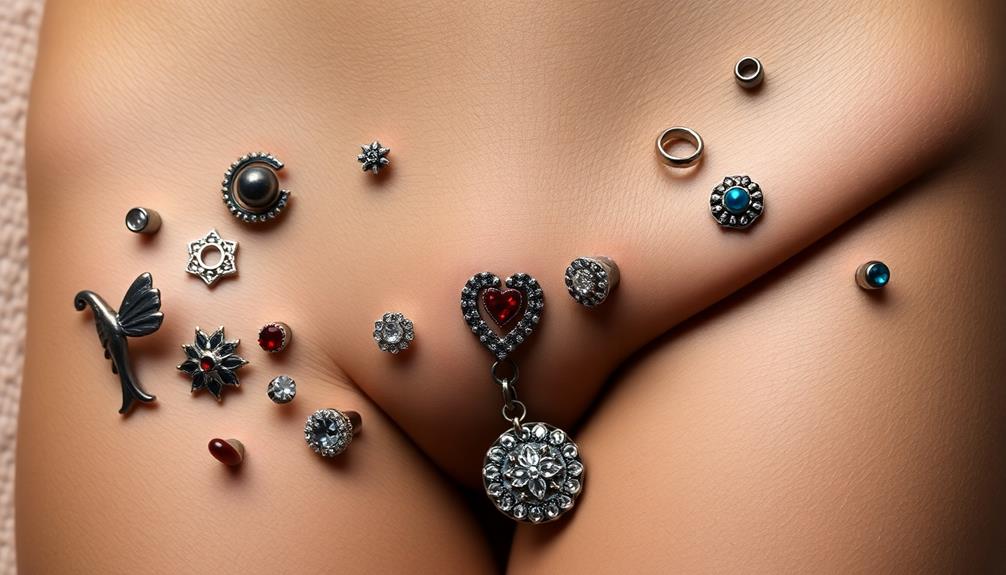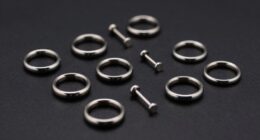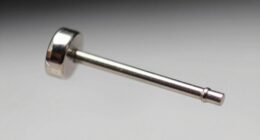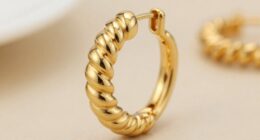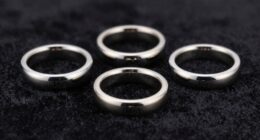When you get a tongue or oral piercing, expect some initial speech challenges and swelling during healing. It’s important to follow proper aftercare, like gentle rinsing and avoiding irritants, to prevent infection or damage that could prolong recovery or affect speech. Be patient as your tongue adapts, and avoid playing with the jewelry. If you keep these tips in mind, you’ll better understand how to heal smoothly and keep your speech clear—discover more tips below.
Key Takeaways
- Tongue piercings typically heal within 4 to 6 weeks, during which speech may be temporarily affected.
- Swelling and soreness can impact speech clarity initially, but usually improve as healing progresses.
- Avoid playing with the jewelry or twisting it, as this can cause trauma and prolong speech difficulties.
- Proper oral hygiene and gentle cleaning help reduce swelling and prevent infections that could impair speech.
- Most individuals regain normal speech once healing is complete and swelling subsides.
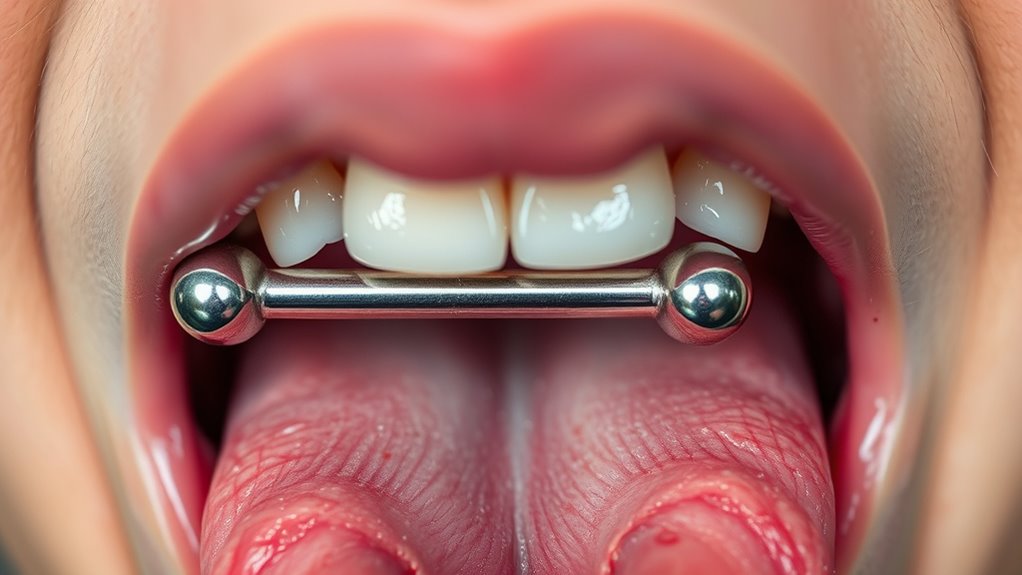
Tongue and oral piercings have gained popularity as bold forms of self-expression, but they also come with potential risks and considerations. One of the most important aspects to focus on is understanding piercing complications that can arise during the healing process. Swelling, pain, and bleeding are common early on, but more serious issues like infections, chipped teeth, or gum damage can develop if you’re not careful. Proper aftercare is essential to minimize these risks and support smooth healing.
Tongue and oral piercings can pose risks like infections, chipped teeth, and gum damage without proper care.
To avoid piercing complications, you need to pay close attention to your oral health from day one. Good oral hygiene tips include gently rinsing your mouth with a saline solution after eating or drinking, avoiding irritating substances like alcohol and tobacco, and steering clear of spicy or acidic foods that can inflame your piercing. Regular brushing with a soft-bristled toothbrush is also pivotal, but be gentle around the piercing site to prevent additional irritation. Maintaining a clean environment helps prevent bacteria buildup, which could lead to infections or prolonged healing times. Data privacy concerns highlight the importance of safeguarding your personal health information, especially when visiting multiple healthcare providers for follow-up care.
During the healing phase, it’s normal to experience some discomfort, but if you notice excessive swelling, persistent pain, or signs of infection such as pus or fever, you should consult your piercer or a healthcare professional promptly. Infections can escalate if ignored, leading to more complicated issues that might require antibiotics or even removal of the jewelry. Avoid playing with or twisting the piercing, as this can cause trauma, increase swelling, and delay healing.
Healing times vary depending on the type of piercing, your body’s response, and how well you care for it. Tongue piercings typically heal within 4 to 6 weeks, but you must remain vigilant during this period. Refrain from kissing, oral sex, or contact with potentially contaminated surfaces to reduce the risk of infection. Also, be cautious when eating or drinking—hot beverages and spicy foods can irritate the new piercing and prolong recovery.
Once healed, maintaining good oral hygiene continues to be essential. Regular dental check-ups and continued gentle cleaning help prevent long-term issues like gum recession or tooth damage. Remember, a well-maintained piercing not only looks good but also minimizes the likelihood of complications. By following these guidelines, you can enjoy your piercing while protecting your oral health and ensuring a smooth healing process.
Frequently Asked Questions
How Long Does It Typically Take for Tongue Piercings to Fully Heal?
Typically, tongue piercings take about 4 to 6 weeks to fully heal. Your healing timeline depends on factors like oral hygiene, piercing location, and your body’s healing ability. During this period, you should avoid irritating foods and follow your piercer’s aftercare advice. Keep in mind that individual healing factors vary, so some may heal faster or slower. Patience and proper care are key for a smooth healing process.
Are There Specific Foods I Should Avoid During Healing?
You should avoid spicy, acidic, or hot foods during healing, as they can irritate your piercing and delay recovery. Stick to soft, cool Healing foods like yogurt, smoothies, and soups to prevent discomfort. Diet restrictions are vital for smooth healing, so skip crunchy or chewy items that might snag or damage the piercing. Staying mindful of what you eat helps your tongue heal faster and keeps infection risks low.
Can Tongue Piercings Cause Long-Term Speech Issues?
Tongue piercings can cause long-term speech issues if they interfere with your tongue mobility or cause swelling. You might experience temporary speech impairment during healing, but with proper care, lasting problems are unlikely. However, if the jewelry restricts your tongue’s movement or causes scarring, it could affect your speech over time. Always choose a professional piercer and follow healing guidelines to minimize risks.
What Are the Signs of Infection or Complications?
Watch for warning signs like swelling, soreness, or pus that point to potential problems. If your piercing becomes excessively painful or if you notice persistent redness, these could be signs of infection. Rejection may cause the jewelry to loosen or migrate. You might also experience a foul odor or bleeding. If any of these symptoms appear, see a professional promptly to prevent further complications and protect your health.
How Do I Care for My Piercing to Prevent Rejection?
To prevent rejection, you should follow proper piercing aftercare diligently. Keep your piercing clean with saline solution, avoid touching it with dirty hands, and steer clear of irritating foods or drinks. Avoid playing with the jewelry and don’t change it prematurely. Regularly check for swelling or redness, and consult your piercer if you notice any issues. Consistent aftercare helps reduce rejection risks and promotes healthy healing.
Conclusion
Remember, tongue and oral piercings can take several weeks to heal, and they may temporarily affect your speech. Did you know that about 20% of oral piercings get infected or cause complications? By following proper aftercare, avoiding irritating foods, and consulting your piercer or doctor when needed, you can enjoy your piercing safely. Stay patient and attentive to your body’s signals—your smile will be worth it in the end!

